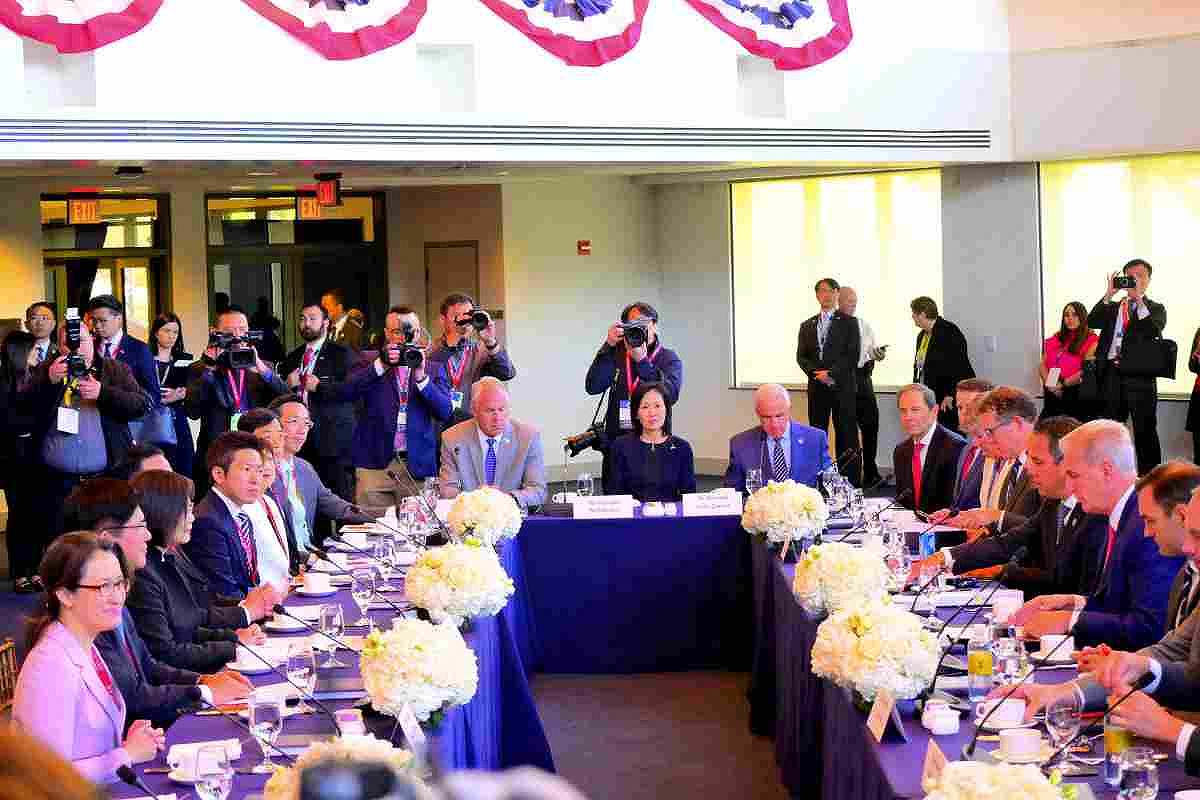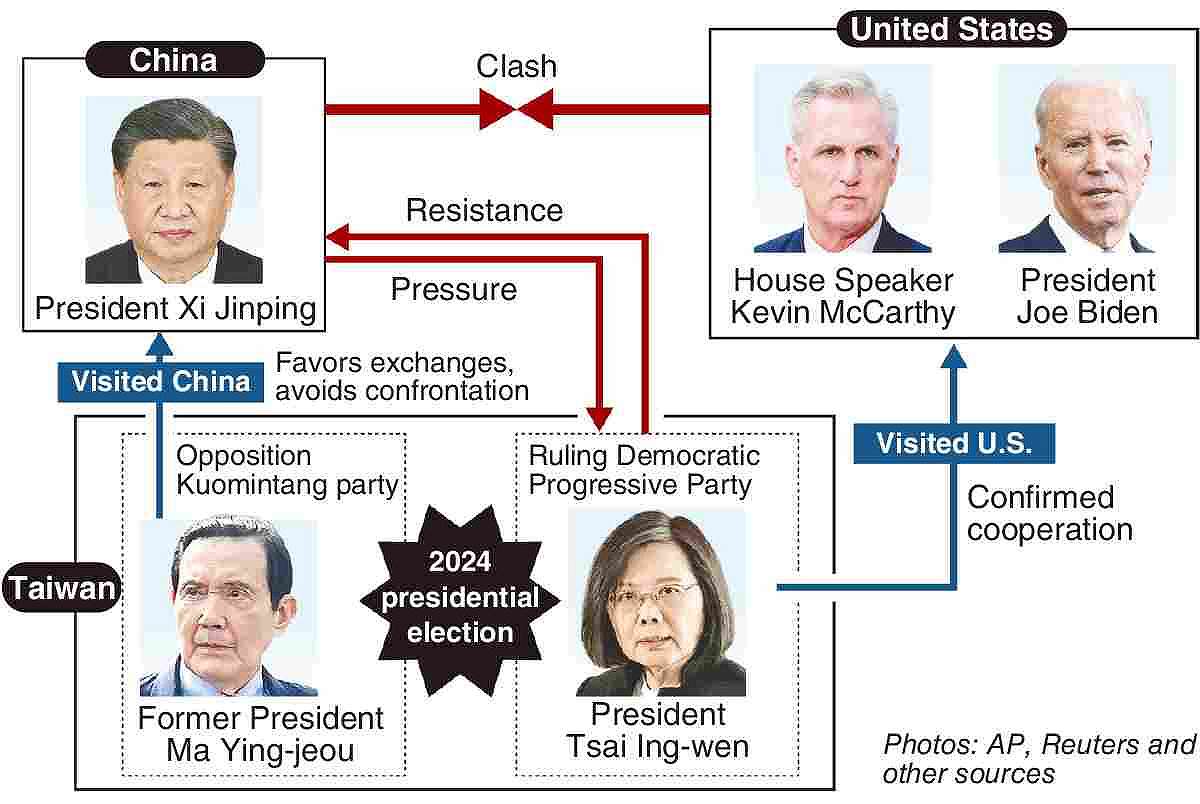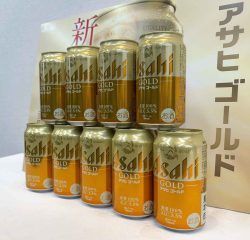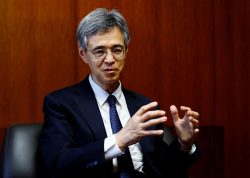
Taiwan and U.S. officials meet at the Ronald Reagan Presidential Library near Los Angeles on Wednesday
19:47 JST, April 7, 2023
Taiwan President Tsai Ing-wen’s meeting with U.S. House of Representatives Speaker Kevin McCarthy on Wednesday indicated cooperation between Taipei and Washington has moved to a new stage.
Although the United States insists there is no change to its “one-China” policy, closer ties with Taiwan are becoming a reality, which is increasingly ruffling China’s feathers.
Taiwan presidents routinely meet with U.S. Congress members when they transit in the United States during overseas trips. However, Tsai’s latest visit was the first to involve talks with the speaker of the House of Representatives on U.S. soil since the United States broke off official ties with Taiwan and formally established diplomatic relations with Beijing in 1979.
The United States framed the meeting as “unofficial” and “private,” but the start was open to the media, and after the talks, McCarthy and Tsai appeared together and issued statements.
An expert on Taiwan’s international affairs described the meeting as a “historic achievement that was effectively similar to an official visit.”
The meeting took place at the Ronald Reagan Presidential Library, a symbolic gesture given that in 1982 the Reagan administration issued the Six Assurances to Taiwan, which included a promise not to set a date for the termination of weapon sales to Taipei.
The United States has continued to support Taiwan over the years in line with these assurances. Tsai said the assurances “laid the foundation for a strong … partnership.”

In a statement issued Thursday, a Chinese Foreign Ministry spokesperson condemned the meeting. The statement described McCarthy as “the number three” in the U.S. government and said the meeting “seriously infringes upon China’s sovereignty and territorial integrity.” Four Chinese entities, including the Foreign Ministry, criticized U.S. ties with Taiwan.
China, which operates under the one-party rule of the Chinese Communist Party, considers the speaker of the U.S. House of Representatives and the administration to be inseparable. Consequently, McCarthy’s interactions with Taiwan’s president are seen as problematic.
China’s stance is significantly different from the U.S. position, which upholds that the House of Representatives is an organ independent from the executive branch of government.
Beijing’s reaction has been relatively restrained so far compared to the sudden announcement of military drills when then Speaker Nancy Pelosi visited Taiwan in August 2022.
Considerable time would be required to prepare for large-scale military drills like those conducted in response to Pelosi’s visit. In addition, such actions would further escalate tensions that could strengthen U.S.-Taiwan unity and trigger a backlash from the international community.
China might be cautious about moves that make the Taiwan public warier of Beijing, which would be a boost to Taiwan’s ruling Democratic Progressive Party ahead of the presidential election early next year.
The difference between China’s reaction to Pelosi’s Taiwan visit and Tsai’s talks in the United States can be attributed to the fact that Pelosi set foot on Taiwan soil, whereas Tsai was making what was officially termed a “transit” through the United States, not a visit.
McCarthy, a Republican who was appointed speaker in January, had considered visiting Taiwan. Pelosi, a Democrat, boldly went even as the Biden administration expressed disapproval of her trip.
Given that the Republican Party had slammed the ruling Democrats for being “soft” on China, McCarthy felt going to Taiwan was essential. However, the Taiwan side put a halt to the plan when in early March the National Defense Ministry suggested that a visit by McCarthy could spark a backlash in which the Chinese military approached waters around Taiwan.
Compounded by concerns about a possible impact on the presidential election, the Tsai administration suggested holding talks in the United States instead.
Tsai’s latest stopover in the United States was the seventh time she has made such a “transit.” Tsai has a track record of extending the length of her stopovers while keeping a careful eye on China. Taiwan and the United States have carefully established how far they can push such stays without provoking an excessive response from China.
According to sources, the Taiwan and U.S. sides held detailed discussions in advance about Tsai’s activities in the United States. Media were kept out of Tsai’s meeting with legislators and the address she delivered while stopping over in New York on the first leg of her trip.
McCarthy led the arrangements for opening his meeting with Tsai to the media on Wednesday. The statement he issued beside Tsai after the talks made no mention of China, and during a press conference, McCarthy said he did not have “current plans” to visit Taiwan.
Although the meeting was an opportunity for the Speaker to bask in the limelight, he also appeared to show consideration for the Taiwan side.
However, China’s response remains to be seen.
There is a possibility that the closeness between Washington and Taiwan could unintentionally cross a Chinese “red line.”
Beijing has criticized the United States over its stance on the one-China policy.
A source said China’s military “cannot sit idly by even though the meeting was held outside of Taiwan.”
The Chinese aircraft carrier Shandong was dispatched this week in a bid to “intimidate” Taiwan, according to the source.
A carrier strike group is also expected to be dispatched to conduct drills in the Pacific. “The scale and timing of that will be decided after China has carefully examined the statements made by McCarthy and others,” the source said.
The administration of Chinese President Xi Jinping invited former Taiwan President Ma Ying-jeou, a senior member of the main opposition Kuomintang party, to China during Tsai’s visit to the United States.
Kuomintang advocates closer ties with Beijing and China is aiming to split public opinion ahead of the presidential election in which Kuomintang aims to regain power.
According to a source, China has many options available for applying greater pressure on the Tsai administration, a possible example of which was seen in late March when the Central American nation of Honduras cut diplomatic ties with Taiwan and established diplomatic relations with China.
Makita is based in Washington; Suzuki is based in Taipei; and Higa is based in Beijing.
Top Articles in World
-

Israeli Ambassador to Japan Speaks about Japan’s Role in the Reconstruction of Gaza
-

Videos Plagiarized, Reposted with False Subtitles Claiming ‘Ryukyu Belongs to China’; Anti-China False Information Also Posted in Japan
-

Nepal Bus Crash Kills 19 People, Injures 25 Including One Japanese National
-

Russia: Visa Required for Visiting Graves in Northern Territories, Lifting of Sanctions Also Necessary
-

China, India Tapping into Promising African Market; Beijing Announces Tariff Cuts, Both Countries Aim to Expand Exports
JN ACCESS RANKING
-

Producer Behind Pop Group XG Arrested for Cocaine Possession
-

Japan PM Takaichi’s Cabinet Resigns en Masse
-

Man Infected with Measles Reportedly Dined at Restaurant in Tokyo Station
-

Israeli Ambassador to Japan Speaks about Japan’s Role in the Reconstruction of Gaza
-

Videos Plagiarized, Reposted with False Subtitles Claiming ‘Ryukyu Belongs to China’; Anti-China False Information Also Posted in Japan






















